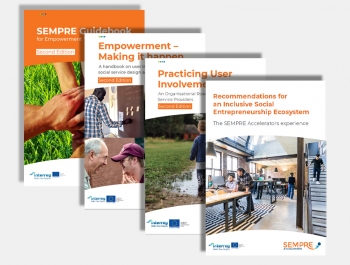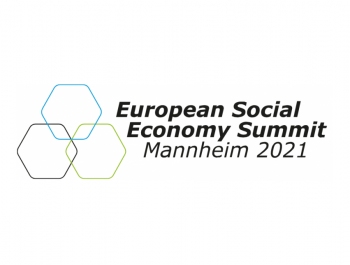The ideas behind the project
 Welcome to SEMPRE Accelerators! SEMPRE Accelerators empowers providers and users of social services to co-create social start-ups. The primary objective of the project is to “accelerate” the most promising social initiatives co-created in the predecessor project (SEMPRE, 2016-2019, see website of the previous project).
Welcome to SEMPRE Accelerators! SEMPRE Accelerators empowers providers and users of social services to co-create social start-ups. The primary objective of the project is to “accelerate” the most promising social initiatives co-created in the predecessor project (SEMPRE, 2016-2019, see website of the previous project).
These user-driven initiatives (“micro projects” as we call them) include a social coffee shop in Latvia, a refugee newspaper from Northern Germany and a social platform for single parents in Lithuania, to name but a few. All these micro projects were successfully developed and launched in the previous project. Now, in SEMPRE Accelerators, the goal is to showcase how these micro projects can grow to become stable, mature and independent organisations that are viable without project funding.
In SEMPRE Accelerators, you will often stumble upon words such as “empowerment”, “rural areas”, “social innovation”, “service co-creation” and the like. What do we mean with these terms, and why do we consider them essential? We tried to answer the most frequent questions below. If you want to learn more, you are invited to consult our publications or contact a project member.
- What do we mean by micro project? What is a social start-up? In the project, both terms are sometimes used interchangeably. However, to be more precise, one could say that the terms mirror the evolution of our small-scale projects: "micro project" describes their status at the outset, while "social start-up" refers to the status that we want to reach during this project. The difference between the two terms also stems from the "history" of SEMPRE Accelerators: In the predecessor project SEMPRE, the partners compiled and tested empowerment tools that can be used by social service providers to assess service needs among disadvantaged groups and initiate co-creation processes that lead to new social services. The application of these tools resulted in around 30 micro projects in which users played an active role and became co-producers of social services. While the focus of SEMPRE was the development of business ideas with tools such as the social business model canvas or the theory of change, the extension stage will go further. The partners will apply additional support mechanisms to accelerate the growth and development of eight of the most promising micro projects and turn them into successful, self-sustaining social start-ups that consistently offer services and/or products on local and regional markets of the Baltic Sea Region.
- What is an "Accelerator Team"? In each of the eight regions, the journey from micro project to social start-up should be accompanied by so-called Accelerator Teams. Each Accelerator Team consists of representatives of the micro projects and established service providers. The teams will pool the ideas and experiential knowledge of the service users and the professional know-how of the social workers in order to overcome such challenges as setting up stable and efficient management and leadership structures, extending the range or improving the quality of the offered services, acquiring financing and involving more service users in operation and management of the start-up.
-
What do we mean by “social services”? Social services are services provided by society to people who are particularly vulnerable or experience difficulties. The services cover areas such as individual and family care, support for people with disabilities, care of the elderly, and support for migrants, or the unemployed, to name but a few. Social services can be provided as public, private and civil society initiatives. SEMPRE Accelerators places particular emphasis on the development of already existing services into mature organisations with a sustainable organisational setup. While this might sound simple from a business development perspective, keep in mind that the services in SEMPRE Accelerators are co-created with end-users, are not-for-profit and serve social and societal interests.
-
What are the roles of end-users and social service providers in SEMPRE Accelerators? SEMPRE Accelerators aims at improving the social service infrastructure by empowering end-users to participate in service design and delivery. Institutional capacity building of social service providers (public, private and third sector) is essential for this process to adapt work methods and instruments and successfully manage organisational change. Against this background, social service providers such as welfare and public sector organisations, NGOs and social enterprises are encouraged and enabled to involve end-users – namely members of disadvantaged groups such as single parents, the elderly or migrants – in the development and delivery of social services.

- Why do we focus on rural regions? SEMPRE Accelerators promotes empowerment in social service provision in rural areas of the Baltic Sea Region. Social service providers such as welfare and public sector organisations, NGOs and social enterprises are encouraged and enabled to involve end-users – namely members of disadvantaged groups such as single parents, the elderly or migrants – in the development and delivery of social services. Many rural areas of the Baltic Sea Region find themselves in a downward spiral, where outward migration and economic downturn lead to a deterioration of service infrastructure and quality of life and vice-versa. In peripheral regions, competencies that are needed to renew services and stimulate social innovation and entrepreneurship are missing while regional disparities increase. Demographic changes and financial austerity further add to these challenges. Vulnerable groups at the risk of poverty and exclusion are affected strongly by this development because their life chances diminish and their potential is neglected.
- How do we understand “Empowerment” in SEMPRE Accelerators? For the project, we define empowerment as a process that enables service users to develop their confidence and innate potential and to build the capacity to take control of their lives and circumstances by playing an active part in the design and delivery of social service solutions. Empowerment in this sense is seen as a process and desirable outcome that enables social services to be designed and delivered in a way that better meets service users’ needs. The concept of empowerment deployed by SEMPRE is based on processes whereby people who are in a weak position can acquire the strength and power to take control over their own lives by handling the material, structural, social and cultural factors that keep them in a powerless and oppressed position (Elstad & Johanssen, 2017). Defined in this way, empowerment is at the same time a process and a product; that is, working with empowerment makes the service users realise their situation, and they learn and gain competences to change their life situation. This understanding of empowerment indicates there are different dimensions that interact, communicate and need to be considered if empowerment is to realise its full potential: empowerment impacts on the individual, group, organisational and societal dimensions. If you want to learn more about the concept of Empowerment and its theoretical background, we invite you to check our Empowerment Handbook.



